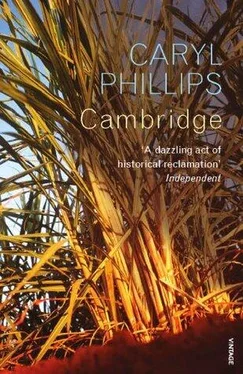Caryl Phillips - Cambridge
Здесь есть возможность читать онлайн «Caryl Phillips - Cambridge» весь текст электронной книги совершенно бесплатно (целиком полную версию без сокращений). В некоторых случаях можно слушать аудио, скачать через торрент в формате fb2 и присутствует краткое содержание. Год выпуска: 2009, Издательство: Vintage Digital, Жанр: Современная проза, на английском языке. Описание произведения, (предисловие) а так же отзывы посетителей доступны на портале библиотеки ЛибКат.
- Название:Cambridge
- Автор:
- Издательство:Vintage Digital
- Жанр:
- Год:2009
- ISBN:нет данных
- Рейтинг книги:5 / 5. Голосов: 1
-
Избранное:Добавить в избранное
- Отзывы:
-
Ваша оценка:
- 100
- 1
- 2
- 3
- 4
- 5
Cambridge: краткое содержание, описание и аннотация
Предлагаем к чтению аннотацию, описание, краткое содержание или предисловие (зависит от того, что написал сам автор книги «Cambridge»). Если вы не нашли необходимую информацию о книге — напишите в комментариях, мы постараемся отыскать её.
Cambridge — читать онлайн бесплатно полную книгу (весь текст) целиком
Ниже представлен текст книги, разбитый по страницам. Система сохранения места последней прочитанной страницы, позволяет с удобством читать онлайн бесплатно книгу «Cambridge», без необходимости каждый раз заново искать на чём Вы остановились. Поставьте закладку, и сможете в любой момент перейти на страницу, на которой закончили чтение.
Интервал:
Закладка:
We had travelled for some minutes beyond Baytown before I realized that we were not making directly for our plantation. I glanced at Arnold who chose not to return my concerned enquiry. This being the case, I decided to submit to the capricious nature of this new adventure. To my right the exotic fraternity of a line of coconut trees determined where land ended and sea began. To my left the light breeze combed through the cane-fields producing a coarse, though not unpleasant, whisper. The moon was bright, though not full, and after turning into a narrow ascending lane, I soon recognized the dark silhouette of Hawthorn Cottage looming ahead. Our negro attendants drew the carriage to a halt, and Arnold provided a supportive arm as I stepped down to the ground. Then, to my surprise, but to my relief also, the servile brace retired into the wilderness of tall grasses and left myself and Arnold quite alone. Arnold's first gesture was to turn and look upon me, which he did politely, but I could read about his manner a desire to touch my face. We stood together, neither one daring to breach the silence, until Arnold cleared his throat as though to speak. But he chose to remain silent. He found the courage, I am happy to say, to make contact, and very soon we felt able to hold each other. Perhaps the heat has introduced some weakness of character into my person, but I must confess to not feeling any guilt as a result of this new intimacy. If the truth be told, the single emotion that came rushing into my body was that of happiness; pure, undistilled, happiness at my good fortune to have discovered a man such as Arnold in the tropical backwater of the Americas.
It often happens in life (and certainly in the novels with which I used to amuse myself in England), that at precisely the moment one expects fortune to smile, clouds of doom descend and obscure that sweet countenance. Not a fortnight has passed by since the merchant's dinner, yet the atmosphere about the plantation has suddenly deteriorated from the levity that one associates with the preparations for Christmas, to sinister intrigue and fear. The goddess Discord has flourished her arms and ushered in wordy war, causing the whole neighbourhood to rise in commotion. The question is the recurrent one of what to do with the recalcitrant African, Cambridge. I have been unable to discover his full history from Stella, for she is reluctant to speak of him, save to inform me in her grotesque lingo that he is a good man and in the right in these continual skirmishes. 'Missy, he good man. You no know what dat man suffer.' Stella did, however, confirm that in spite of all the barriers in his way, this Cambridge is lettered, can read his Bible, and even endeavours to teach it to his fellow blacks, which leads me to conclude that, indeed, this ancient Cambridge is no ordinary negro. Furthermore, it appears to be the case that Mr Brown did in fact offer Cambridge the position of Head Driver as part of his plan to compel some lesser drivers to accept relegation to lowly positions, such as watchmen, and thereby undermine long-established bonds of friendship and loyalty between the field-slaves. Unfortunately, Cambridge refused to collaborate with Mr Brown's scheme. And now this festering conflict has caused some friction between myself and my companion, Stella, though this difficulty merely mirrors the larger conflict between black and white on the plantation.
Dancing, music, and jesting, after the negro fashion, seem to have ceased. They have been replaced with men who, eyes half closed, loll against a wall, or lie inert upon a sunny bank, and wilfully doze away leisure hours until called upon to return with reluctance to the labours of the field. Beyond the staring whites of their eyes, and the glittering rows of dazzling teeth, I can now see that the saturnine house-servants look upon me with a new suspicion. As soon as they think me out of earshot they renew their animal chatter as though I am in some way responsible for this disagreeable situation. They obviously assume that I am prejudiced on the side of the young overseer in this irksome dispute, but in this they are mistaken. I am merely waiting for Arnold to dispense his justice, being confident that whatever decision he reaches will most likely be the correct one.
A second cause for concern is Christiania, who has chosen this moment to disappear. Again the plantation is divided along rather crude lines, with the blacks having some knowledge (or so we feel) of her whereabouts, and the whites wishing to have her declared a runaway and so set in motion a hunt for her black hide. Should she be recaptured she will naturally be thoroughly flogged or else transported, a punishment which the majority of the whites, having been compelled to endure the arrogance of this woman, would dearly wish to see. It would be difficult for the outsider properly to discern the nature of this unhappy atmosphere, for it is possible that the stranger might mistake this sourness of heart for the feelings that normally occur in this clime, and indeed fail to recognize anything particular amiss. But to those of us, black and white, who are familiar with plantation life, this new unease is causing deep distress.
This morning, over breakfast, I chanced to mention to Arnold that he might consider arriving at his decision before Christmas. He asked me which decision, clearly now conscious of the double judgement in his keep. I took it upon myself to suggest that the decision over Cambridge was the more urgent of the two, for the curious behaviour of this over-confident, Bible-reading slave demanded immediate attention. I confessed to Arnold that to my observation this bondsman had about his gaze an unsound quality. Furthermore, I insisted that he seemed determined to adopt a lunatic precision in his dealings with our English words, as though the black imagined himself to be a part of our white race. Arnold mused on all that I said, then added that because the blacks were destroying the goodwill of the Christmas season he would soon pronounce upon Cambridge. If necessary, the matter of Christiania could wait until the new year for it seldom happened that a runaway managed to leave the island. In the case of this witless negress, successful flight to a distant shore seemed highly unlikely. We ate in silence for a short while, until I asked Arnold if surely there was not something else that was troubling him. I insisted that the circumstances of my being on the island could not, of course, be permitted to unseat the established system of discipline which secures the labour and obedience of the slaves. Arnold said nothing. I continued, pointing out that although I suspected a woman such as myself must occasionally prove an intolerable nuisance for one such as Arnold, I was prepared to risk tarnishing my own reputation as good company if only I might provide him with a secure vessel into which to pour his well-corked grief.
Eventually Arnold spoke, but he would not look me in the eye, offering only the cropped pate of his head. He admitted that due to a virulent strain of cane-blight the sugar was not as healthy as he had hoped, and he feared for the financial returns on this year's harvest. This worry was compounded by the fact that an overseer close to Arnold (although he was too discreet to divulge the man's name) had developed the powerful dispatcher known as the yaws, a terrible and obstinate contagion transmitted by illicit coupling with a black. On making its nauseous appearance the yaws brings with it frightful ravages, twitching pains extending to the very marrow, and a loathsome deformity of bone and flesh. The disease leaves the afflicted wretch at a distance from his fellow kind, often abandoned by man and left to the mortal office of nature. Recovery, although rare in older sufferers, demands cleanliness, a nutritious diet without meat or salt animal food, and the dedication to observe this strict regimen despite the inward signs of pain and the outward signs of humiliation. Poor Arnold! That he should be compelled to observe such sufferings! This season of goodwill was rapidly becoming a nightmare for him. He took himself up to return to work with the spirit and posture of a man only too aware of approaching mortality.
Читать дальшеИнтервал:
Закладка:
Похожие книги на «Cambridge»
Представляем Вашему вниманию похожие книги на «Cambridge» списком для выбора. Мы отобрали схожую по названию и смыслу литературу в надежде предоставить читателям больше вариантов отыскать новые, интересные, ещё непрочитанные произведения.
Обсуждение, отзывы о книге «Cambridge» и просто собственные мнения читателей. Оставьте ваши комментарии, напишите, что Вы думаете о произведении, его смысле или главных героях. Укажите что конкретно понравилось, а что нет, и почему Вы так считаете.












